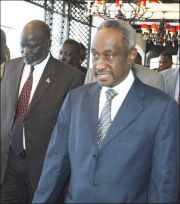Sudan government, southern rebels resume peace talks in Kenya
NAIROBI, Oct 7 (AFP) — Sudan’s government and main southern rebel group opened a fresh round of talks in Nairobi with a new commitment to ending Africa’s longest-running civil war amid increasing international outrage over a separate conflict in the western Sudanese region of Darfur.

|
|
Sudanese first vice-president Ali Osman Taha (R) and John Garang of Sudan People Liberation Army (SPLA) arrive at the venue before the opening of fresh round of talks, in Nairobi, with a new commitment to clinching an end to Africa’s longest-running civil war. |
Khartoum’s delegation was led by Vice President Ali Osman Taha and his opposite number was John Garang, the leader of the rebel Sudan Peoples’ Liberation Movement/Army (SPLM/A).
The protracted negotiations resume as the threat of international sanctions hangs over Khartoum for its role in Darfur and amid fears that full-scale conflict might flare up again in Sudan if the government and SPLM/A fail to reach a comprehensive deal by the end of the year.
“My presence here is an expression of our unwavering commitment … to clear all outstanding issues,” Garang said at the opening ceremony.
“I wish to assure you all that I am prepared to remain here engaged to complete negotiations and agreements on all outstanding issues and sign a comprehensive peace agreement,” Garang added.
The Darfur conflict must be resolved, the rebel chief said, adding: “Having peace in one part of the country and having war and instability in others parts of the country cannot be useful to anybody in the Sudan or the region.”
Taha said that Khartoum government was committed to reach a final deal, and promised the world “good news” at the end of this fifth bout of face-to-face talks with Garang since September 2003.
“I confirm the readiness of the Government of Sudan to continue negotiating with sincerity and good faith,” he said.
“We understand the importance of these negotiations, we are therefore going to give the negotiations their due attention,” Taha said, explaining that its successful conclusion would go a long way to stabilising Sudan.
With more than two years of high-level talks in Kenya and six protocols covering key political issues behind them, the government and the SPLM/A appear to be very close to the finishing line, leaving only technical issues of a comprehensive ceasefire in the conflict that has opposed them since 1983, and security arrangements to be ironed out.
But the wrinkles, as well as key players on both sides of the negotiating table, have proved more stubborn than many anticipated, and the last discussions on these issues broke up in deadlock in July.
Mediators said the 20-month-old Darfur rebel conflict, described by the United Nations as having sparked the world’s worst humanitarian disaster, had delayed a final deal to end the war in southern Sudan that has claimed at least 1.5 million people and displaced four million others.
Since the talks adjourned in July, “we have been concerned with the development of the Darfur crisis, for besides touching on the momentum of the southern peace process, it also put in jeopardy a comprehensive peace being realised in the south,” chief mediator Lazaro Sumbeiywo explained.
“The people of Sudan are waiting, it is now time for you to deliver peace,” Kenyan Regional Cooperation Minister John Koech told the two leaders.
Koech said it would be “a great tragedy” if the marathon talks fail, given enormous efforts and resources already spent and the lives lost in the past 21 years.
UN representative to Sudan Jan Pronk said a final deal would help pacify other regions of the vast African nation and warned the foes from delaying the deal.
“The parties today are very close to reaching an agreement. In fact they have not been this close before,” he said, warning Khartoum and SPLM/A against “temptations of postponing or buying time, with the hope of making more gains elsewhere outside the peace process.”
“This is the time to complete what you started,” said Pronk.
“At this critical juncture, leadership and political will is what the international community requires from you. It is this process that would bring a lasting peace in Sudan, not only in the south but other regions,” he said.
